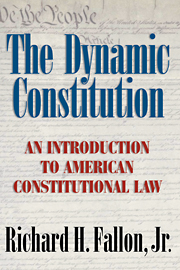Book contents
- Frontmatter
- Contents
- Preface
- Prologue: Bush v. Gore
- Introduction: The Dynamic Constitution
- Part I Individual Rights Under the Constitution
- 1 Freedom of Speech
- 2 Freedom of Religion
- 3 Protection of Economic Liberties
- 4 Rights to Fair Procedures
- 5 Equal Protection of the Laws
- 6 Fundamental Rights
- Part II The Constitutional Separation of Powers
- Part III Further Issues of Constitutional Structure and Individual Rights
- Appendix: The Constitution of the United States
- Notes
- Index
5 - Equal Protection of the Laws
Published online by Cambridge University Press: 25 July 2009
- Frontmatter
- Contents
- Preface
- Prologue: Bush v. Gore
- Introduction: The Dynamic Constitution
- Part I Individual Rights Under the Constitution
- 1 Freedom of Speech
- 2 Freedom of Religion
- 3 Protection of Economic Liberties
- 4 Rights to Fair Procedures
- 5 Equal Protection of the Laws
- 6 Fundamental Rights
- Part II The Constitutional Separation of Powers
- Part III Further Issues of Constitutional Structure and Individual Rights
- Appendix: The Constitution of the United States
- Notes
- Index
Summary
No State shall … deny to any person within its jurisdiction the equal protection of the laws.
– The Equal Protection Clause of the Fourteenth AmendmentIn 1994, jennifer gratz applied for admission to the University of Michigan. Gratz was a good student. Her adjusted high school grade-point average was 3.8 on a 4-point scale, and she had achieved a solid but not top-notch score on a standardized college admissions test. At many colleges this record would have ensured admission. At the University of Michigan, it did not. After applying in the fall of 1994, Gratz received a letter in January 1995 notifying her that she would need to wait until April for a final decision: Although she was “well qualified,” she was “less competitive than the students who have been admitted on first review.” In April a second letter arrived, this one with the news that Gratz had been rejected.
Unwilling to accept this result, Gratz filed suit in federal court, alleging that the University of Michigan had deprived her of “the equal protection of the laws” guaranteed by the Equal Protection Clause of the United States Constitution. In particular, Gratz, who is white, argued that Michigan unconstitutionally discriminated against her by granting race-based admissions preferences to members of historically underrepresented minority groups.
The facts of Gratz v. Bollinger (2003) were complicated, in part because the University of Michigan's undergraduate admissions policy – like those at many elite colleges – took a number of factors into account.
- Type
- Chapter
- Information
- The Dynamic ConstitutionAn Introduction to American Constitutional Law, pp. 106 - 137Publisher: Cambridge University PressPrint publication year: 2004



